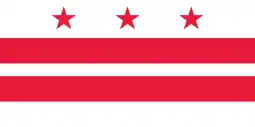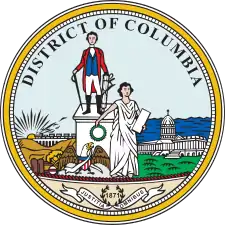Initiatives and referendums in the District of Columbia
There is a defined process for initiatives and referendums in the District of Columbia. The process is laid out in the D.C. Code.[1] If an initiative receives enough signatures, is put on the ballot, and is approved by voters, it then must go through a 30-day review by the United States Congress.
 |
|---|
| This article is part of a series on the politics and government of District of Columbia |
|
The D.C. Council also has the power to reverse voter-approved initiatives, as it did in 2001 regarding term limits[2] and in 2019 regarding the tipped minimum wage.
Voter-approved initiatives include Initiative 59 (legalization of medical marijuana), Initiative 71 (legalization of recreational marijuana), and Initiative 77 (abolition of the separate tipped minimum wage).
References
- "DC Code - § 1–1001.16. Initiative and referendum process". code.dccouncil.us.
- Chan, Sewell. "When a City Council Repealed Term Limits".
- "You've Heard Of Initiatives 71 and 77. What Happened To 72-76?". Archived from the original on 2018-07-24. Retrieved 2018-07-17.
- https://www.dcboe.org/getattachment/About-Us/About-Us/Initiative-Measures/Master-List-of-Initiatives-and-Initiative-Measures-7-10-2018-(1).pdf.aspx?lang=en-US
This article is issued from Wikipedia. The text is licensed under Creative Commons - Attribution - Sharealike. Additional terms may apply for the media files.
